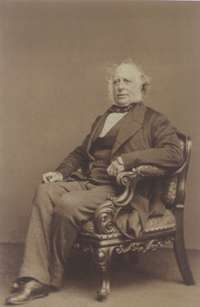Currie baronets
The Currie Baronetcy is a title in the Baronetage of the United Kingdom.[1] It was created on 11 January 1847 for Frederick Currie, Foreign Secretary to the Indian Government and a member of the Supreme Council of India. He was a grandson of William Currie (1721–1781), nephew of William Currie (1756–1829), who was Member of Parliament for Upper Gatton and Winchelsea, and the brother of Vice-Admiral Mark John Currie.

Several other members of the family may also be mentioned. Henry Currie, cousin of the first Baronet, was Member of Parliament for Guildford. The slaveholder Isaac Currie, uncle of the first Baronet, was the father of Raikes Currie,[2] Member of Parliament for Northampton, who was the father of diplomat Philip Currie, 1st Baron Currie. Fendall Currie, sixth son of the first Baronet, was a Major-General in the Army. Frederick Alexander Currie (d. 1902), son of Major Mark Currie and grandson of the first Baronet, was a Lieutenant-Colonel in the Army.
The presumed sixth Baronet never successfully proved succession[3] and was never on the Official Roll of the Baronetage which shows the baronetcy dormant since 1978 on the death of the 5th Baronet.[4]
Currie baronets, of Wickham Bishops (1847)
- Sir Frederick Currie, 1st Baronet (1799–1875)
- Sir Frederick Larkins Currie, 2nd Baronet (1823–1900)
- Sir Frederick Reeve Currie, 3rd Baronet (1851–1930)
- Sir Walter Louis Rackham Currie, 4th Baronet (1856–1941)
- Sir (Walter) Mordaunt Cyril Currie, 5th Baronet (1894–1978)
- Alick Bradley Currie, presumed 6th Baronet (1904-1987)
- Donald Scott Currie, presumed 7th Baronet (1930-2014)
- Mark Donald Currie, presumed 8th Baronet (born 1970)
References
- "No. 20685". The London Gazette. 22 December 1846. p. 5925.
- Fernandes, C. Island Off the Coast of Asia: Instruments of statecraft in Australian foreign policy (Melbourne: Monash University Publishing, 2018), 14.
- Leigh Rayment's list of baronets – Baronetcies beginning with "C" (part 5 )
- "Baronetcies to which no succession has been proved". Standing Council of the Baronetage. 31 December 2017. Archived from the original on 6 November 2018. Retrieved 23 November 2018.
- Debrett's Peerage and Baronetage (1990 edition). New York: St Martin's Press, Charles Kidd, David Williamson, (editors).